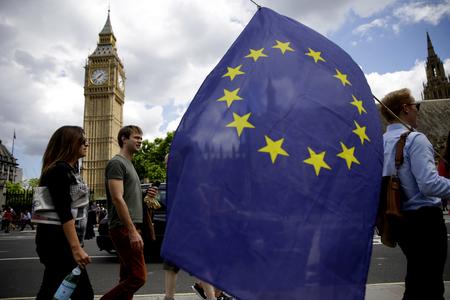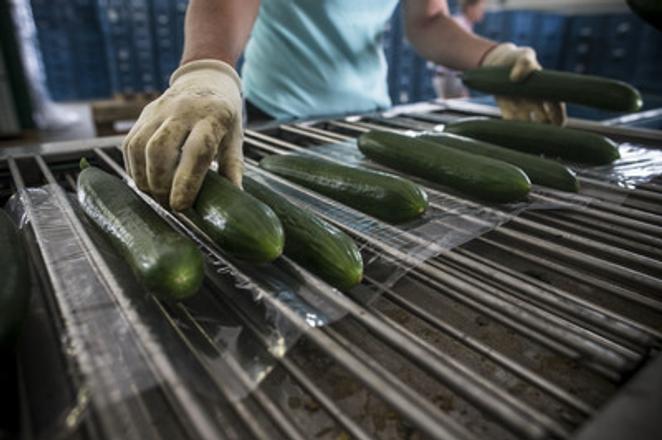Bendy bananas and crooked cucumbers - the barmy EU rules we are now free of, read the headline in the tabloid newspaper The Sun after the United Kingdom voted to withdraw from the EU in June. The problem is that rules regulating cucumber shapes have not been on the books since 2009.
On this and many other issues, there is often a gap between perception and reality when it comes to the European Union.
“Various hoaxes and myths about European Union are spreading with speed of light,” the spokesman for the European Commission (EC) Representation in Slovakia Andrej Králik told The Slovak Spectator. “Some of them may be amusing; some make one wonder what people are willing to believe in.”
After the Brexit vote, Slovak extremists started their own campaign for Slovakia leaving EU. This sparked discussion in media what EU truly regulates and what positive effects on Slovakia it has.
The Slovak Spectator and the Sme daily in cooperation with EC prepared list of EU measures which makes life of Slovaks easier together with most common myths spreading about EU.

Traditional British breakfast
Not all Brussels’ ideas which seem crazy on the fist glance are myths. However critics often do include the context surrounding such measures or an explanation for why they were introduced.
One of the most well-known myths is claim that EU wants to regulate trivialities like the curve of cucumbers on market shelves. The EU introduced this regulation in 1994 and it applied on first class cucumbers as a means for sellers to evaluate quality of goods imported from abroad. Countries like France, Italy, Spain or Greece were against the cancellation of this directive in 2009.
Another popular myth spread also by Slovak media is that EU wants to ban kettles, toasters, hairdryers or irons. In fact, the proposed bans apply to the production of new inefficient electric appliances.
“They don’t apply on current stocks and gradually decreasing number of electric appliances therefore there is no need to throw out anything,” EC claims on its website.
The aim of this rule is not to ban those electric appliances but to spare money of people who use them. EU wants to reach that by regulation of their power input or by forcing producers to use more effective parts.
Despite this, about 65 percent of voters considered this approach to be an assault on British breakfast in the Daily Telegraph online poll.
Critics say that ban on power input will not save energy because vacuum cleaners or toasters will have to work longer to do their job. On the other hand, EC says that this will make producers to increase effectivity without consuming loads of energy. The process already took place in the case of refrigerators, according to the EC.

Dealing with customers
Many of EU regulations try to give advantage to customers in their relationship with sellers. Slovaks are among the best informed Europeans when it comes to their rights but still they do not know abut some of them, according to Králik.
For example, if the flight is delayed airlines based in EU have to provide passengers with meals and refreshments reasonably reflecting length of their wait. They should also let them to make two telephone calls, faxes or e-mails free of charge.
If the flight is delayed for more than five hours passengers can get a refund or fly with a different airline. If a flight is delayed for a whole day, the passenger is entitled to have one night in hotel.
The EU also ended disputes of online shops and customers, with a rule that allows buyers the right to cancel the order and return goods within 14 days without specifying the reason. At the same time, customers in all member countries have the right to at least two years of free warranty.
When EU citizens want to return oversized goods purchased on-site from a doorstep seller, the sellers have to take away them on their own expenses.
In consumer contracts related mainly to the purchase of goods for personal use, provisions and general business conditions have to be written in readable typeface. Letters have to have middle height at least 1.9 millimeters.
At the same time, the subject and value of the contract in a consumer contract cannot be written in smaller type face than other parts of the contract. This rule does not apply on the contract title and the names of its parts.
People often do not know about these advantages because they filter information based on their life situation and learn mostly about those rights which directly affect them, Králik said. Moreover, many regulations from Brussels become active only after member country accepts them, he added.
“Recipients of some benefit therefore don’t see that such rule was created thanks to EU,” Králik said.

Traveling abroad
Some other measures are connected with free movement of goods and people within EU.
For example, due to pressure of European Commission on mobile operators the price of roaming calls and SMSs dropped by 80 percent. Mobile internet abroad (data roaming) became cheaper by 91 percent.
The initial plan talked about the total abolition of pricing of mobile services abroad in EU countries on December 15, 2015. However this was delayed to June 15, 2017.
Though European Union does not have the system of automatic mutual recognition of diplomas it is quite easy for some professionals to prove their expertise in other EU countries. This applies on nurses, midwifes, doctors (general practitioners and specialists), dental practitioners, pharmacists, architects and veterinary surgeons. It is because EU harmonised education of those people.
Moreover, thanks to the EU’s Erasmus program more than 20,000 Slovak students have studied abroad since 2004. Further, more than 3,000 students gained experience in foreign companies and 7,000 university teachers from Slovakia participated on exchange programs with other teachers.
“Historically the highest number of our countrymen study and work in EU not because our wages are the lowest or because our education system is of lesser quality,” sociologist Miloslav Bahna from the Slovak Academy of Sciences told The Slovak Spectator. “It’s only because both things have never been so available.”
Also, the protection of victims of crime and violence should apply in every EU country. The European Parliament and the EU Council introduced European protection order. The EC’s directive allows court protection orders made in criminal cases in one member state to be enforced in another. Slovakia adopted the law in the end of 2014.
“If the court orders the protection of victims, which means that it forbids the offender to approach victims, enter their house or contact them in writing, telephone or e-mail form this protection will “travel” with the citizen anywhere within the European Union,” said Justice Ministry spokeswoman Alexandra Donevová, as quoted by TASR newswire.
The EU also wants to improve health care for its citizens traveling abroad. Therefore it introduced European Health Insurance Card (EHIC). The owner of the card is eligible for standard health care in all member countries without being limited by prices for medical treatments. The card does not cover transport back home or apply to health care facilities which are not connected to the public health care system. Therefore Slovakia's biggest health insurer, Všeobecná Zdravotná Poisťovňa (VšZP), suggests people to combine the EE card with commercial insurance.



 (source: SME)
(source: SME)